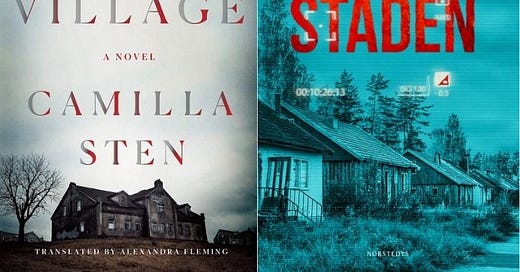How are you? The world appears to be, as usual, on fire. Which is sad and stressful and infuriating.
On the positive, more immediate end of things: Summer Reading is finally over at the library, and suddenly I feel like I have room to breathe again.
The end of Summer Reading means, for me, that I’m fully ready—despite the 80 degree days—to shift into fall. I get up super-early in the morning, when it’s still dark, and I light a couple of candles, and I just… read, or listen to a podcast, or even, sometimes, watch a movie?
I started that last year, and it did so much good for my brain (and probably my heart) that my general mood never took the dive that it usually does when we start losing daylight. Which was amazing, so I’m hoping that I can replicate that this year.
Reading: The Lost Village, by Camilla Sten.
Translated from the Swedish by Alexandra Fleming, The Lost Village is about a woman who’s trying to make a documentary about the ghost town at the center of an unsolved mystery. In 1959, almost the entire population of the town—including members of the documentarian’s family—vanished. The only people left were an infant—parentage unknown—and a woman who’d been stoned to death in the town square.
She’s got a tiny crew, five days, and just enough money to get the footage she needs to put together a Kickstarter campaign to fund the project.
Sure, they won’t have cell reception while they’re there. Sure, she’s got some huge, unresolved issues with one of the other members of the crew. Sure, she’s keeping a few secrets.
But it’s only five days.
What could possibly go wrong?
So, I loved this. It’s scary and it’s atmospheric and it’s smart. It avoids some of the common missteps of the genre—when our heroine holds crucial information back from other characters, for example, her reasoning is entirely understandable—and it’s as much a story about female friendships and unresolved grief, power dynamics and control and manipulation, mental illness and the ease with which a community facing hard times will turn on the “other,” as it is about a ghost town.
I loved how it acknowledged the formative nature of friendships from certain eras in our lives, and how those friendships—even if they’ve lost strength and intimacy, even if they’ve ended entirely—sometimes still carry enough weight and history to punch through the emotional scar tissue.
I happened to read it right around the same time as watching Josephine Decker’s Butter on the Latch, and they both played with communication around trauma—or lack thereof—and how it affects us and our friendships… but overall, if you’re looking for the MUCH LESS GUT-PUNCHY option, I’d stick with this book.
And again, it’s deliciously creepy:
When I focus on Tone’s curled-up figure, I almost think her eyes are glinting at me in the darkness; that she’s lying there, silent and unmoving, staring at me. It makes my heart pound even faster, but the next second I’m convinced it’s all in my head. It’s just the lingering shrouds of sleep over my eyes, that’s all. She’s asleep.

Watching: So! Much! Horror!
We watch horror movies all year long, but we REALLY watch them in the fall. I’ve got a list ready for an annual horror challenge that begins September 15th, but I didn’t want to wait to start, so I set an additional challenge for myself: To average one horror movie a day from September 1st through October. So, 61 horror movies.
So far, I’ve watched eight.
Highlights:
Tenebre (also Tenebrae). Dario Argento, 1982. A serial killer in Rome does a bunch of murders and harasses an American crime writer while he’s at it. One of the weird joys of watching movies by Argento is the knowledge that he can make any given object deadly, ESPECIALLY that big silver pointy sculpture that you have by your front door. (Okay, joy might not be the right word. Also, why do you have a big silver pointy sculpture by your front door??? I can’t wait to watch this one again, it’s fantastic for a million reasons that I haven’t listed here because it would take forever.)
Seance on a Wet Afternoon. Bryan Forbes, 1964. A middle-aged psychic convinces her browbeaten husband to kidnap a child so that she can insinuate herself into the investigation and raise her profile. Very much about unresolved grief and untreated mental illness; very much a bummer. Incredible lead performances. Not a traditional horror movie, but I defy anyone to watch this movie and then make the argument that the main characters are NOT living in a state of constant horror.
The House That Screamed (also La residencia). Narciso Ibáñez Serrador, 1969. A girl gets dropped off at a all-girls’ boarding school in Olde Timey France; said boarding school is a hotbed of psychological and physical torture and MURDER. For the most part, this one watches like a grainy old TV movie (with, you know, torture and boobs), but HOO BOY, it took some turns that I did not expect, and ultimately it kind of blew my mind?
Always here for your related recommendations.
Talk to you soon,
Leila




